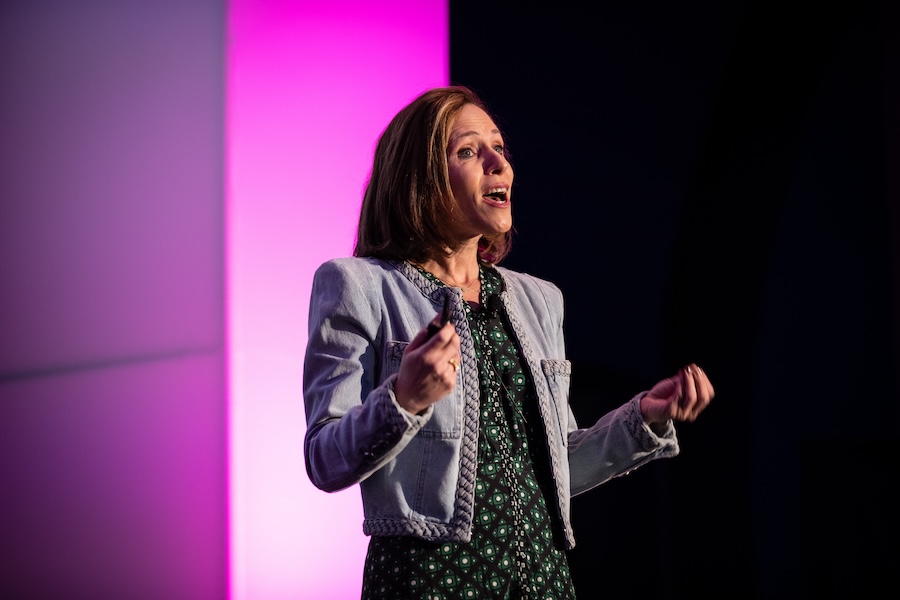Helping Employees Organize Their Lives Now for When They're Not Around Later


On the proverbial starting line of her new life, excitedly using wedding planning websites and apps, Abby Schneiderman started wondering about the finish line. Where were all the websites and apps and guides for end of life?
That was the small beginning of what would eventually become Everplans, a platform that helps people get prepared for the unexpected. Schneiderman detailed the company’s story and pillars at From Day One’s conference in Atlanta.
A tech entrepreneur, her curiosity wasn’t that out of the ordinary. She researched and found plenty of resources for having children, buying a home, financial planning, and retirement planning. But that’s where it ended.
“There were no other life stages covered online,” she said. Schneiderman brought her findings to tech veteran Adam Seifer. “I said, who's helping people deal with death?” It’s interesting to note that not all big life stages happen for everyone. Not everyone gets married or has kids, but each person will face death.
“Everybody has to deal with this one day,” she said, whether it’s for themselves or for their aging parents, but this is something we can’t avoid.”
To fill the online gaps, Schneiderman and Seifer started writing content. Over 500 articles worth of content at first, which has grown into the thousands. It covers every conceivable end-of-life topic, such as how to write a will, what to wear to a funeral, and how to name a health care proxy. Everplans was born. They immediately saw the value of their work.
“We started coming up very highly in Google searches for every article we were writing.”
A New Perspective
Then came hard, personal experience. Schneiderman’s 51-year-old brother was killed by a drunk driver. In an instant, everything changed for her and her family. Thankfully he had life insurance, but that was where the documents and pre-planning stopped. No will, no organization of his accounts, no funeral wishes.
That’s when Everplans made a major pivot. Rather than only provide articles and resources, Schneiderman and Seifer wanted to do more. “We wanted to help people get a plan in place ahead of time, so that when the time does come or when an emergency strikes, families have access to what they need.”
Today, Everplans is a technology platform that helps people to organize, store, share, and everything from wills to policies to health directives to online accounts up to date. To date, over 30 million have engaged their resources since we launched, and over 160,000 people have created “vaults” on the platform, with over 3 million pieces of information stored and shared.

The co-founders also wrote a book, In Case You Get Hit By a Bus: How to Organize Your Life Now for When You're Not Around Later, in the hopes of helping people be better prepared for what’s to come. That’s why Everplans has entered the benefits space—to help companies help employees get the peace of mind that comes with getting things in order.
“There’s a major tie between personal productivity and workplace productivity,” Schneiderman said.
Speaking of full-time employees in the U.S., here are some statistics she reported: 65% feel anxious when critical information and documents are all over the place, 84% are less productive when they feel disorganized, and 86% are less stressed when they feel more organized. And Everplans aims to help remedy that.
After creating an Everplans vault, you can upload documents and pertinent information, as well as designate “deputies” or loved ones who should have access to your vault now and after you die. Below are the four pillars Everplans recommends each person looks at when adding to their vaults. The platform also nudges you at regular intervals to make sure everything is up to date.
Documents: Things like legal documents, wills, assets, power of attorney, advanced directives, and more. Since end-of-life documents like power of attorney can be hard for many people, Everplans give pointers on how to broach this topic with different people in your life.
Insurance: Policies like life, health, auto, home, property, pet, disability, and more. Schneiderman explained that every year, billions of dollars go unclaimed because of policies family members don’t know about.
Assets: This includes financial accounts and digital assets. Making sure that bank accounts, safe deposit box information, credit card accounts, 401k and other retirement accounts, and every other account are in the vault is vital for loved ones to be able to access them after you pass. At the very least, put in what the account is even if you don’t put usernames or passwords. As far as digital assets go, did you know the average person has 240 passwords? Social media, cryptocurrency, cell phone, unlock computer code, email accounts, and just about everything else. Schneiderman said they did a study, and 65% of people keep track of passwords in their heads. She recommends using two password managers, one for work and one for personal.
Leaving a Legacy: Think about the different types of things that matter to you that you want to pass down, Schneiderman said. Recipes, videos, photos, stories, and anything else you can think of that leave a legacy.
The great thing about putting your affairs in order is this: you can have peace of mind knowing that if anything does happen to you, your loved ones don’t have to scramble. They can access all of the needed information without searching for it or worrying they’ve missed something. That would make any employee sleep better at night.
Editor's note: From Day One thanks our partner, Everplans, for sponsoring this thought leadership spotlight.
Carrie Snider is a Phoenix-based journalist and marketing copywriter.
The From Day One Newsletter is a monthly roundup of articles, features, and editorials on innovative ways for companies to forge stronger relationships with their employees, customers, and communities.